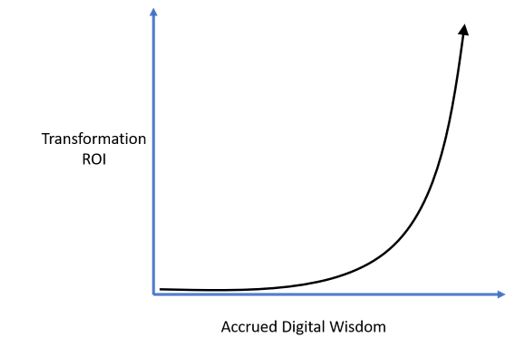

Over the course of the last two years, digital transformation ROI is probably the topic I have been asked about the most. Clearly, return on investment continues to be challenging for most industrial companies. There certainly are many reasons why transformation ROI is so elusive. Organizations continue to experience missteps with digital transformation strategy. Often, struggles with culture change lead companies to ignore the much more challenging human side of digital transformation.

Ironically, these transactional leaders now find themselves in the midst of their own unknown and are having to learn along the way. The total industry disruption brought on by COVID-19 is a mirror (not identical, to be sure) to the uncertainty of transformation. They’ve not seen anything on this scale in their lifetime. They can’t predict the outcome or totality of the financial impact, nor can they define the timeline for return to stability. In fact, they are engaged in their own experiments, trying to determine the best way to drive and sustain success in an environment that requires them to set aside what they used to know and, instead, figure out how to learn along the way.
Now, many of these same transactional leaders are being given leeway, understandably, on short-term earnings projections due to the uncertainty they face. Yet, they never extend that hall pass to their own employees who are struggling to learn what they need to be successful in demonstrating sustained digital transformation ROI.
Too often, these transactional leaders make decisions that put them on the innovation sideline, squelching the very ability of their companies to learn how to respond at speed to market conditions with more agility than their competition. Each time they do so, the implications of their decisions ripple exponentially and negatively, moving them further away from the curve. To be fair, there are some industrial companies with very good, forward-thinking leaders that understand innovation requires organizational maturity and the relentless pursuit of digital wisdom.
The market bears out the difference between those that seek and grow digital wisdom and those that do not. As I mentioned just a few weeks ago, every new industrial disruption grows the performance gap between those with leaders committed to change and those that dither by clinging to outmoded ways of decision making. Both will struggle with transformation, of course, because it is a complex and non-linear cultural, technological and economic overhaul of the business and the markets it serves. However, the former will learn how to achieve digital transformation ROI while the latter will stumble along wondering why mistakes, false starts, and dead-end investments are so common with digital initiatives. What type of leader do you want to be?

